Quantum Computing Vs. Blockchain: Impact on Cryptography

Blockchain ledgers which are cryptographically secured are practically “unbreakable” under normal conditions when you take into consideration the present state of computational technology. Its unbreakable nature which is dependent on the assumption that technology remains the same. Meaning, if there is a change in the way computing is currently being executed, blockchain systems as we know it may come under serious threat. This brings us to the question, how soon are we going to experience such a change? In the last 3 decades, physicists have been making important strides towards a working quantum computer which in time could lead to a major change in computing as we know it.
What is a quantum computer?
This is any device that adopts the principles of quantum mechanics to process calculation, store data and transform information. Unlike regular computers that work in bits (either 1 or 0), quantum computers process information in quantum bits (which can be 1 and 0). This concept is commonly referred to as superposition.
Quantum computers and blockchain
Taking into consideration all major reservations concerning the concept of blockchain’s immutability and high security. The evolution of quantum computing could have a serious effect on the level of trust placed on public-key cryptography, which serves as the underlying security for blockchain. Although there are enormous potential in quantum computing one key feature which is very important in the area of blockchain technology and cryptography is its ability to process certain algorithms a lot faster than any other computers. One key use case is in running the famous Shor’s algorithm for factor decomposition.
According to a team of researchers in Russia, a major potential risk posed by quantum computer arises from the fact that the security of blockchain is super reliant on a one-dimensional mathematical function, which is pretty straight forward to calculate but very difficult when calculated in reverse. These functions are typically used to generate digital signatures as well as validate transactions.
As such, if a criminal possess a working quantum device, chances are that the device would be able to carry out reverse calculations a whole lot faster thereby enabling him to be able to impersonate users and hack into their digital accounts. With regards to mining, such a criminal could hijack the entire process of updating the ledger, double-spend coins and manipulate transaction history.
Experts are of the opinion that it would take about 5 to 10 years before we can have quantum computers that could seriously threaten the integrity of blockchain. At the same time these experts were also in unison with regards to the solutions for handling potential quantum-driven attacks. A large majority agree that it would take a gradual shift to quantum-resistant cryptography and also building the right infrastructure to support it. What this simply means is that Blockchain will definitely have to evolve, but it highly unlikely that quantum computing poses a threat to their existence.
![]()